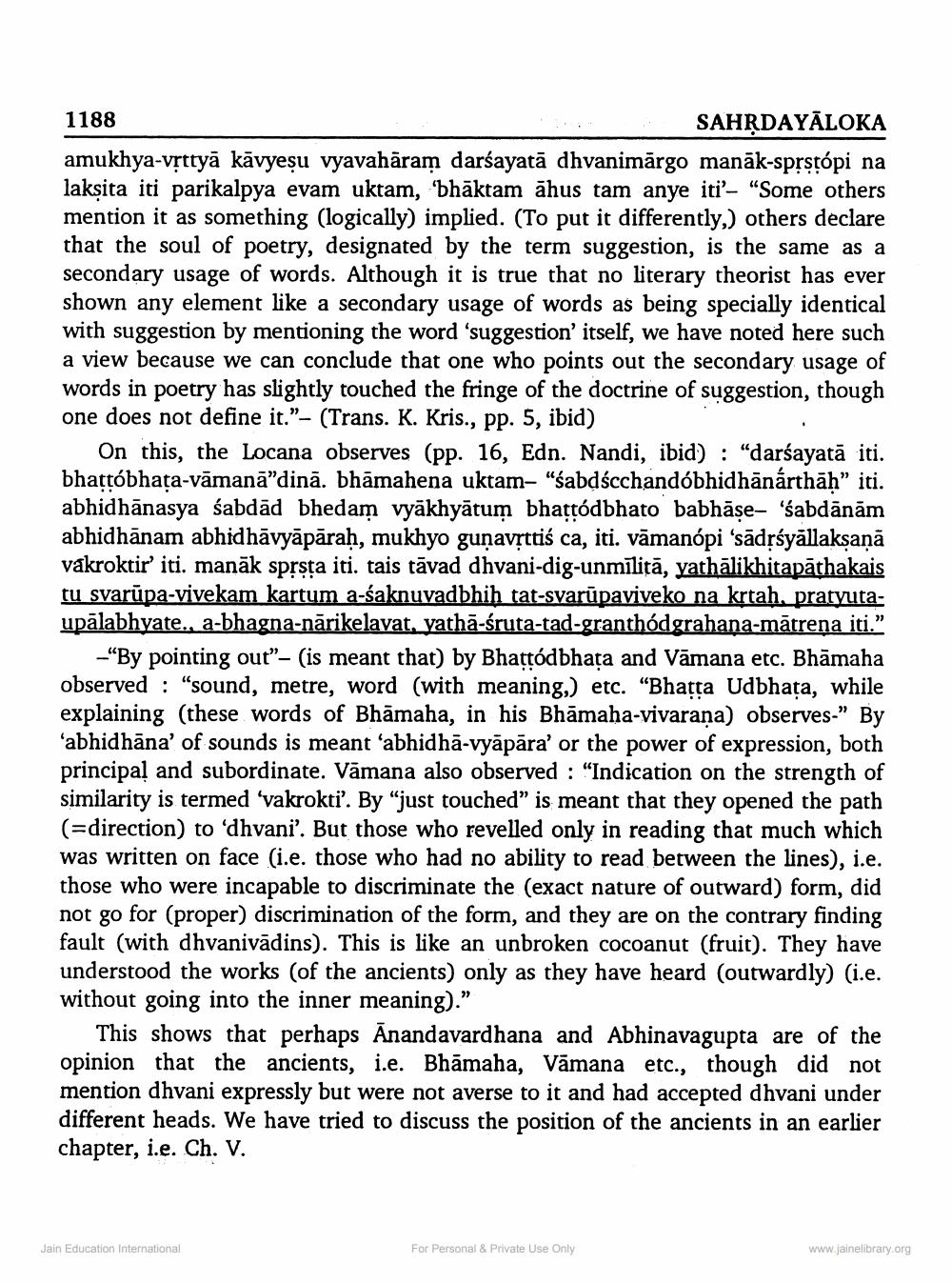________________
1188
SAHRDAYĀLOKA amukhya-vstryā kāvyeșu vyavahāram darśayatā dhvanimārgo manāk-sprstópi na laksita iti parikalpya evam uktam. 'bhāktam āhus tam anve iti' mention it as something (logically) implied. (To put it differently,) others declare that the soul of poetry, designated by the term suggestion, is the same as a secondary usage of words. Although it is true that no literary theorist has ever shown any element like a secondary usage of words as being specially identical with suggestion by mentioning the word 'suggestion' itself, we have noted here such a view because we can conclude that one who points out the secondary usage of words in poetry has slightly touched the fringe of the doctrine of suggestion, though one does not define it."- (Trans. K. Kris., pp. 5, ibid)
On this, the Locana observes (pp. 16, Edn. Nandi, ibid) : "darśayatā iti. bhatóbhața-vāmanā”dinā. bhāmahena uktam, “sabdścchandóbhidhānárthāh” iti. abhidhānasya śabdād bhedam vyākhyātum bhatródbhato babhāșe- 'śabdānām abhidhānam abhidhāvyāpārah, mukhyo gunavrttiś ca, iti. vāmanópi 'sādrśyāllaksanā vakroktir iti. manāk sprsta iti. tais tāvad dhvani-dig-unmīlitā, yathālikhitapāthakais tu svarūpa-vivekam kartum a-saknuvadbhih tat-svarūpaviveko na krtah, pratyutaupālabhyate., a-bhagna-nārikelavat, vathā-śruta-tad-granthódgrahana-mătrena iti.”
-“By pointing out”- (is meant that) by Bhattódbhasa and Vāmana etc. Bhāmaha observed : "sound, metre, word (with meaning,) etc. "Bhatta Udbhata, while explaining (these words of Bhāmaha, in his Bhāmaha-vivarana) observes." By abhidhāna' of sounds is meant 'abhidhā-vyāpāra' or the power of expression, both principal and subordinate. Vāmana also observed : "Indication on the strength of similarity is termed 'vakrokti'. By "just touched” is meant that they opened the path (=direction) to 'dhvani'. But those who revelled only in reading that much which was written on face (i.e. those who had no ability to read between the lines), i.e. those who were incapable to discriminate the exact nature of outward) form, did not go for (proper) discrimination of the form, and they are on the contrary finding fault (with dhvanivādins). This is like an unbroken cocoanut (fruit). They have understood the works (of the ancients) only as they have heard (outwardly) (i.e. without going into the inner meaning).”
This shows that perhaps Anandavardhana and Abhinavagupta are of the opinion that the ancients, i.e. Bhāmaha, Vāmana etc., though did not mention dhvani expressly but were not averse to it and had accepted dhvani under different heads. We have tried to discuss the position of the ancients in an earlier chapter, i.e. Ch. V.
Jain Education International
For Personal & Private Use Only
www.jainelibrary.org




